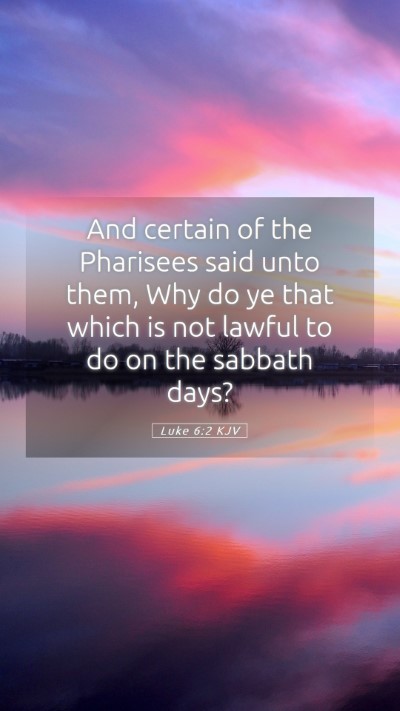Bible Verse Meaning of Luke 6:2
Luke 6:2 states: "But some of the Pharisees said, 'Why are you doing what is unlawful on the Sabbath?'" In this verse, we encounter a crucial interaction between Jesus and the religious leaders of the time, specifically the Pharisees. Below, we summarize the insights from various public domain commentaries to provide a deeper understanding of this passage and its implications.
Contextual Background
This passage is situated during Jesus' ministry, where He often challenged the established Jewish traditions and laws, particularly concerning the Sabbath. The Pharisees, known for their strict observance of the law, represented a significant religious authority and were attentive to any deviations from their interpretations of Scripture.
Commentary Insights
-
Matthew Henry's Commentary:
Henry emphasizes that the Pharisees are quick to criticize Jesus and His disciples for what they perceived as breaking the Sabbath. He points out that the controversy arises from a misunderstanding of the purpose of the law. The Sabbath was intended for rest and worship, not as a burden. Henry illustrates that Jesus’ actions serve to highlight the spirit of the law rather than mere adherence to its letter.
-
Albert Barnes' Notes:
Barnes elaborates on the Pharisees' rigid interpretation of the law. He notes that by pointing out the disciples for plucking grain, the Pharisees missed the essence of what the Sabbath represents — a day meant for man’s benefit. Barnes stresses that Jesus often redefined righteousness, showing that mercy and necessity take precedence over ritualistic observances.
-
Adam Clarke's Commentary:
Clarke underscores the significance of understanding the historical context of the Law and the Sabbath. He suggests that the Pharisees were more interested in following traditions rather than understanding God’s intentions behind those laws. Clarke’s insight encourages readers to reflect on the spirit of the law and to consider how Jesus’ teachings about love and mercy are often contrary to strict legalism.
Theological Implications
This passage raises important questions about the interpretation of Scripture and the role of tradition versus the core message of the Gospel. Tutors and leaders in Bible study groups can use this verse to initiate discussions on how contemporary believers might avoid falling into the trap of legalism. The dialogue between Jesus and the Pharisees serves as a timeless reminder of the need for a heart aligned with God’s will, rather than solely following rules out of obligation.
Cross References
- Matthew 12:1-8 - Discusses Jesus’ teaching on Sabbath observance.
- Mark 2:23-28 - Highlights the purpose of the Sabbath as a gift to humanity.
- Exodus 20:8-11 - Provides the original commandment regarding the Sabbath.
Application for Daily Life
Understanding this verse can significantly impact how we approach our relationship with God and the observance of our practices. It prompts one to ask, “What do I prioritize in my faith?” and “Am I allowing the spirit of the law to govern my actions?” This reflection can guide believers in applying the teachings of Jesus to ensure they express love and compassion in their daily lives.
Conclusion
In summary, Luke 6:2 serves as a pivotal teaching moment wherein Jesus challenges the rigidity of the laws upheld by the Pharisees. Through Bible verse meanings, interpretations, and explanations offered by esteemed scholars, we gain valuable insights into the heart of God’s commandments. The ongoing challenge remains: to seek a deep understanding of Scripture and to liberate ourselves from the constraints of legalism, fostering a relationship characterized by love, mercy, and grace.


